JEDDAH: Since its establishment in 1979, the Iranian regime’s modus operandi has been to blame “foreign enemies” for Tehran’s domestic problems and the population’s dissatisfaction with the regime, Majid Rafizadeh, Harvard-educated Iranian-American political scientist, told Arab News on Tuesday.
He was reacting to tweets by Iranian Supreme Leader Ali Khamenei on Tuesday saying: “Once again, the nation tells the US, Britain, and those who seek to overthrow the Islamic Republic of Iran from abroad that you’ve failed, and you will fail in the future, too.”
Rafizadeh said it is also a tactic that the Iranian authorities use in order to suppress domestic opposition. “In addition, by blaming foreign powers, the regime avoids taking any responsibility and accountability,” he said.
Iranian security forces arrested some 3,700 people during widespread protests and unrest over the past two weeks, a lawmaker said, offering a far higher number than authorities previously released.
The demonstrations, which began Dec. 28 over economic grievances, quickly spread across the country to become the largest seen in Iran since the disputed 2009 presidential election. Some protesters called for the overthrow of the government, and at least 21 people were killed in clashes.
Rafizadeh said many of those who are arrested are from the younger population, women, and university students.
“In an unprecedented move, the regime forces are also engaged in ‘preventative’ arrests. They are continuing to arrest people who were not involved in the protests. The arrests are aimed at imposing fear in society. It also provides the Iranian authorities with the pretext to arrest more people who are considered an opposition to the regime.”
Human rights activists outside of Iran told The Associated Press they were not surprised by the figure. Some 4,000 arrests followed the 2009 protests.
Rafizadeh said human rights organizations, Amnesty International and the UN should closely monitor the situation of those who are arrested in Iran. “Following the 2009 demonstrations, many protesters who were arrested were tortured and raped in Kahrizak Detention Center. The international community should also put pressure on the Iranian authorities to stop its campaign of ‘preventative’ arrests and release innocent detainees,” he said.
Activists also said they had concerns about Iran’s prisons and jails being overcrowded and dangerous, pointing to allegations of torture, abuse and deaths that followed the mass arrests of 2009. The New York-based Center for Human Rights in Iran says at least three detainees arrested in the recent protests have already died in custody.
“Given the systematic rape and torture of detainees in 2009 in very overcrowded and inhumane conditions, we are extremely worried about the fate of these thousands of detainees and the lack of information and access by their families and lawyers,” said Hadi Ghaemi, the executive director of the center. “It is a very troubling situation.”
Mahmoud Sadeghi, a reformist lawmaker from Tehran, offered the new figures for those arrested in a report carried Tuesday by Parliament’s official news website. Authorities previously spoke of hundreds of arrests in Tehran, while other provinces offered only piecemeal figures, if any at all.
Sadeghi said 3,700 was the best number he could immediately offer, given that various security forces around the country had been involved in the arrests. Iran put more police on the streets over the arrest, including anti-riot squads, while the paramilitary Revolutionary Guard also deployed its motorcycle-riding Basij volunteer force.
Blaming ‘foreign enemies’ for domestic problems regime policy since 1979: Iran expert
Blaming ‘foreign enemies’ for domestic problems regime policy since 1979: Iran expert













